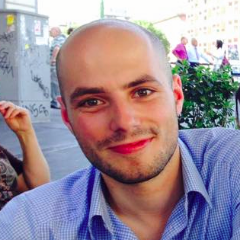The Accademia Teatro alla Scala is unique in providing opportunities not only to singers and dancers, but to the full range of opera professionals including conductors, instrumentalists, scenographers, tailors, carpenters, photographers and lighting designers. The quality of its output is high (Anita Rachvelishvili and Pretty Yende are just two graduates of the voice department) which makes the Accademia's annual production – part of La Scala's main season – an event with as much draw as many other titles on the roster. This year there is another reason to bag a ticket while stocks last: Humperdinck's Hänsel und Gretel is on the bill, conducted by the expert of late Romantic German repertoire Marc Albrecht.
But it is Sven-Eric Bechtolf's production that provide the biggest thrills. It conforms to the trend established by previous Accademia productions, by keeping things simple. Bechtolf's seductively imaginative staging consists in a flat pack fairytale world full of surprises that delight like the contents of a pop up book. A shanty town in Act 1 is backgrounded by Manhattan style skyscrapers which cedes to a layered forest filled with strawberries, plumes of theatrical fog and larger than life cut outs of the singing cuckoo and his nodding companions. The coup de théâtre with which Bechtolf transitions between these two images – by dimming the lights and projecting swirling clouds over a descending scrim behind which the stage is swiftly rearranged, so that one scene fizzles into the next – is stunning. But nothing is more delectable than Act 3's depiction of the gingerbread house: a 2D representation overlain with alluring video projections of rainbow swirl lollipops and barber poles fronted with dancing gingerbread men.
Bechtolf dapples this magical world with realism, so that dishevelled vagabonds push makeshift cardboard homes (one becomes a kind of smoke-emitting tardis from which the Witch and the Sandman make their entries) as well as trolleys laden with assorted possessions across the stage. “Poverty porn" is how such portrayals of hardship presented in the cosy confines of an opera house might be described; but Bechtolf's imagery is illusively powerful. One scene seems evocative of the film Miracolo a Milano – Vittorio De Sica's tale of a shanty-town community constructing a utopia out of misery – when images of angels elevated skywards are projected onto a scrim. In Bechtolf's hands, Humperdinck's intoxicatingly whimsical score becomes an exhortation to lose ourselves to imaginary worlds beyond our mundane realities.
Yet Albrecht's delivery is enough to whisk us away on its own accord. Playing was scrappy during the overture, but soon settled into a lush, vital tapestry full of throbbing forward momentum. The parts of Hänsel and Gretel were securely delivered by Anna Doris Capitelli and Francesca Mano respectively, their pure and even tones appropriately youthful in sound.
Chiara Isotton – the fast-rising La Scala regular – painted a pleasingly flustered Gertrude in her rich, full tone, while Gustavo Castillo – highly theatrical as her husband Peter – proved the hinge of the entire production by delivering both his evocation of witches in forests as a convincing bluff and his reunion with Hänsel und Gretel knowingly carefree: two bookends that hint at the dreamlike nature of the events that occur between. That did not make Mareike Jankowski's Witch, whose snarling “Hocus Pocus” aria were especially effective, any less terrifying. Marc Albrecht insists Humperdinck's is not an opera solely for children. You'd better believe him.




